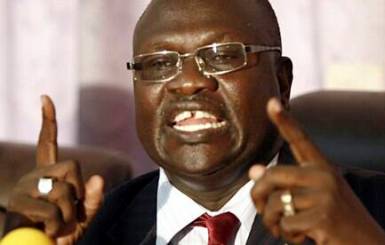S. Sudanese in Uganda welcome rebel formation of 21 states
January 7, 2015 (KAMPALA) – South Sudan’s Phow and Gawaar communities in Uganda have welcomed the recent appointment by the armed opposition of chiefs of general staffs, their deputies as well as the recent formation of 21 states in the conflict-hit nation.

“We believe and honour the SPLM/SPLA chairman and commander- in-chief, Dr. Riek Machar Teny Dhurgon on his aspiration on giving several keys positions to South Sudanese militarily leaders in various areas,” he said.
In an order issued on 22 December 2014, the armed opposition leader dissolved the current 10 states in South Sudan and created 21 federal states mainly on the basis of the former old districts, which were created by the British colonial administration.
These are 1) Fashoda state, 2) Adar (North East Upper Nile) state, 3) Sobat state, 4) Lich state, 5) Jonglei state, 6) Bieh state, 7) Phow state, 8) Pibor state, 9) Kapoeta state, 10) Imatong state, 11) Central Equatoria state, 12) Yei River state, 13) Mid-West Equatoria state, 14) Western Equatoria state, 15) Warrap (Tonj) state, 16) Lol state, 17) Lakes state, 18) Rumbek state, 19) Northern Bahr el Ghazal state, 20) Wau state and 21) Western Bhar el Ghazal (Raga) state.
In the new administrative units, Upper Nile state is divided into three separate states, while Jonglei state is itself divided into four.
Eastern, Central and Western Equatoria states are each divided into two states. Also split into two is Warrap state.
Lakes and Western Bhar el Ghazal states divided into two states each, while Northern Bhar el Ghazal and Unity states remain undivided, with the latter’s name changed to Lich state.
As former greater regions, Greater Bahr el Ghazal is divided into seven new states, instead of four; Greater Upper Nile into eight states, instead of three; and Greater Equatoria divided into six states, instead of three.
The new states are officially the administrative units for the opposition faction with rebel sources hinting that provisional military governors will as well be appointed.
The new development comes amid unconfirmed reports that the armed opposition group might be receiving sophisticated weapons to face president Kiir’s government.
Both Gatdin Ngundeng, a former chairperson of Phow community in Uganda equally welcomed the oppositions’ federal states proposal.
Jal Duop Yang, a community elder, said creation of 21 states will “end years of suffering”.
“Creation of 21 states will soon eradicate the suffering of people and bring rapid development in the Federal Republic of South Sudan because many counties will soon come out,” he added.
(ST)
